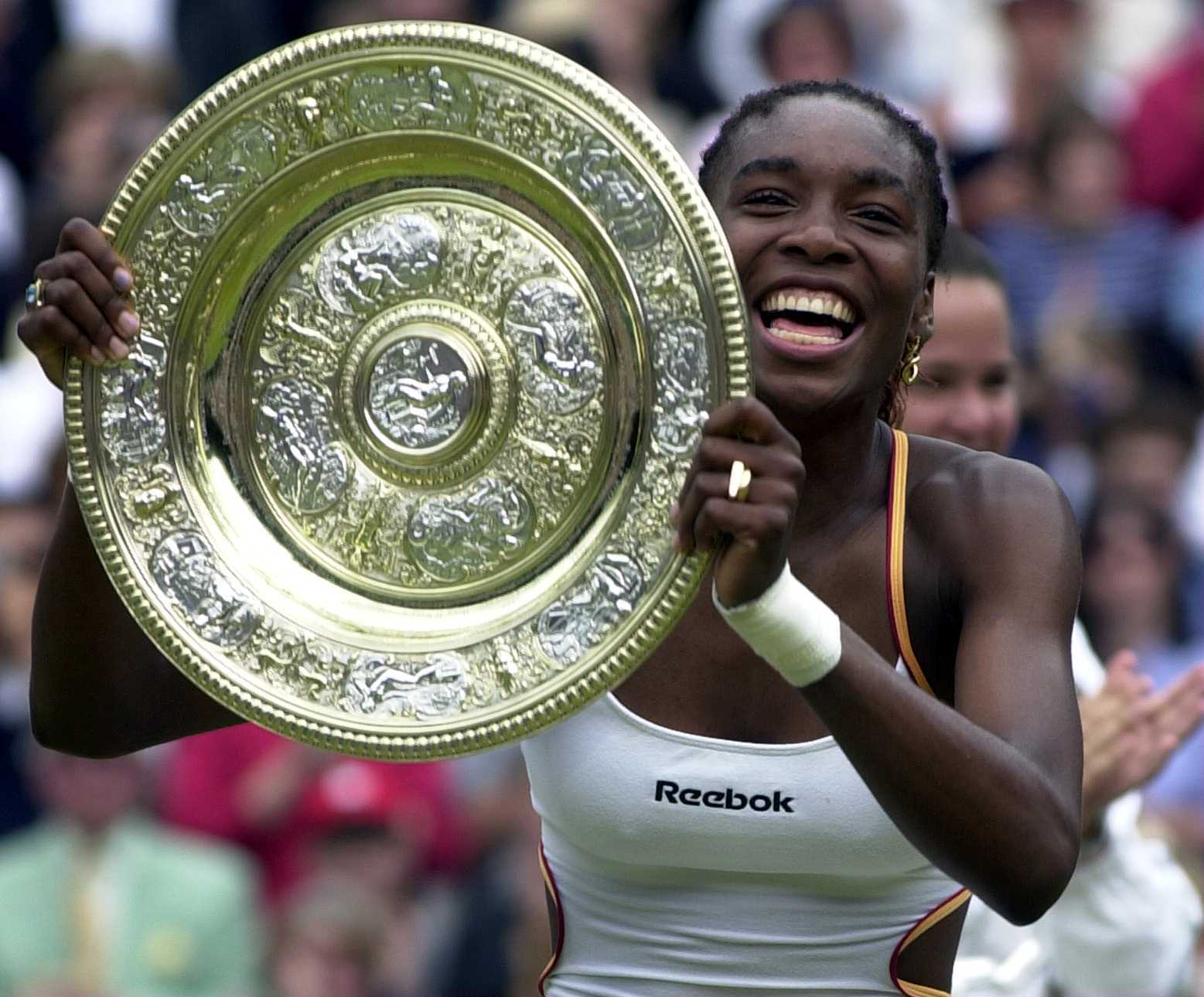Born 15 months earlier, Venus Williams was always little sister Serena’s role model and biggest ally.
Venus was sitting in the team box at the 1999 US Open when 17-year-old Serena ran the table against a daunting list of Hall of Famers — Clijsters, Martinez, Seles, Davenport and the No. 1-ranked Hingis — and won the family’s first Grand Slam singles title.
“You couldn’t help but feel sorry for her when Serena won first,” Lindsay Davenport said. “You knew eventually she was going to win a Grand Slam. I mean, who knew when it was going to be?”
As it turned out, not very long.
Before leaving for England, Venus ventured into a Florida mall and bought a dress she envisioned wearing at the Wimbledon champions’ ball.
“I had one dress I could wear,” Williams said. “It was last year’s, and colors have changed since then. I was scrambling. It was an extra incentive to win, because if I didn’t, I wouldn’t get to wear this wonderful dress.”
At 6-foot-1 — closer, actually, to 6-3 — with a forever wingspan, Venus was built for the lush lawns of the All England Club. Her powerful serve and groundstrokes skidded off the grass low and hard, her soft hands gave her the ability to finish points definitively at net.
Tendinitis in both wrists caused her to miss the first four months of the season, so Venus had only played nine matches on European clay going in. Her 20th birthday came only two weeks before Wimbledon’s first ball.
Venus’ first Wimbledon, in 1997 at the age of 17, ended in the first round with a loss to Magdalena Grzybowska. She won eight of 10 matches over the next two years, reaching the quarterfinals, losing there to Jana Novotna (on her way to the tile) and seven-time champion Steffi Graf.
With the turn of the century, though, Venus would prove interstellar at Wimbledon. The No. 5 seed ran through her first four opponents — Kveta Peschke, Ai Sugiyama, Nathalie Dechy and Sabine Appelmans — all in straight sets.
The top seed and World No. 1 Martina Hingis did not go as quietly, but Venus prevailed 6-3, 4-6, 6-4 to advance to the semifinals against … little sister Serena, seeded eighth. It was understandably emotional and a bit awkward.
Father Richard Williams couldn’t watch — he walked around Wimbledon Village during the match — while their mother, Oracene, was home back in Florida. The final was 6-2, 7-6 (3) and Venus, who comforted Serena with a big hug, was into the final.
“She’s a real competitor, probably even more than what I am as far as when it comes to losing,” Venus said of Serena. “She hates to lose.”
The same was true of Davenport, the defending champion. Nevertheless, Venus won the first set fairly easily and was serving for the match when a nervy pair of double faults gave Davenport a second life at 5-all. The tiebreak was all Venus, who won five straight points riding that big forehand. The final was 6-3, 7-6 (3) and sent Venus literally jumping for joy and rushing to hug Serena.
“Great job,” Serena said to Venus. And it was, for it was the first time that two sisters had each won a Grand Slam singles title.
When Venus hoisted the Venus Rosewater trophy, it seemed like destiny. She became the first Black player to win Wimbledon since Althea Gibson in 1958.
“It had to be hard because people were unable to see past color,’” said Williams, well-versed in the history. “Still, these days, it’s hardly any different because you realize it’s been only 40 years. How can you change years and centuries of being biased in 40 years?”
And then she and Serena went out and won the doubles crown.
The win was a catharsis of sorts. Venus set off on a 35-match winning streak that included six consecutive titles — Wimbledon, Stanford, San Diego, New Haven, the US Open (defeating Davenport again in the final), and the Sydney Olympics (over Elena Dementieva in the gold medal final). Venus and Serena also won the gold medal in doubles.
That run and their sibling rivalry — they met nine times in major finals, four times at Wimbledon — helped inspire Serena to win 23 Grand Slam singles titles.
And after the breakthrough in 2000, Venus found her groove at Wimbledon. She would win five titles in a span of nine years and seven majors titles in all.
“It’s really great because I’ve been working so hard all my life to be here,” Venus said. “It’s strange. I’d go to bed at night and I’d dream I’d won a Grand Slam, but when I woke up, there was the nightmare.
“Now, I don’t have to wake up like that anymore.”
